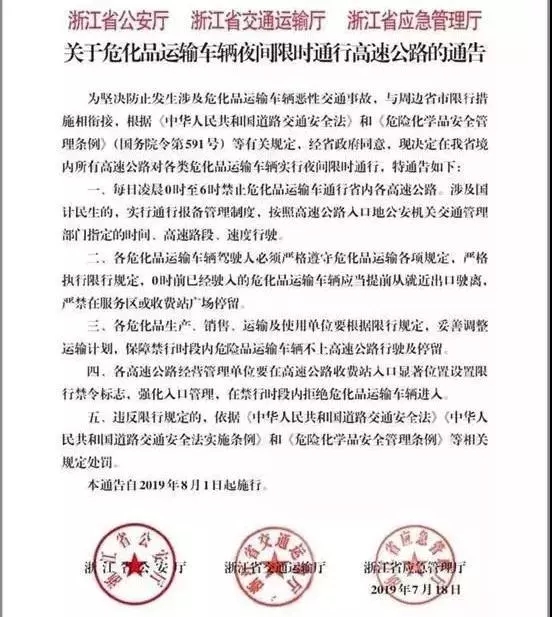Recently, the reporter learned from the expressway traffic police headquarters of Zhejiang Provincial Public Security Bureau that, in order to ensure the safety of Expressway traffic, the Zhejiang Provincial Public Security Department, Transportation Department and Emergency Management Department jointly proposed that, with the consent of the Zhejiang Provincial Government, the transportation of dangerous chemicals will be formally carried out on expressways in Zhejiang Province from August 1, 2019. The policy of time-limited traffic at night.

According to the regulations, after the implementation of the policy, besides the transport vehicles which are specially approved by the relevant departments, the traffic of dangerous chemicals transport vehicles will be forbidden on the expressway section of Zhejiang Province from 0:00 to 6:00 a.m. every day. If dangerous chemicals transport vehicles have entered the expressway at night, they should leave the nearest exit in advance before 0:00 the next day, and stop at service area or toll plaza is strictly prohibited. Violators will be punished by high-speed traffic police according to relevant laws and regulations.

(Figure Source: Hangzhou Network)
1. It is forbidden for dangerous chemicals transporters to pass through provincial expressways from 0:00 to 6:00 a.m. every day. In cases involving the national economy and the people's livelihood, the traffic report management system shall be implemented, and the traffic management department of the public security organ at the entrance of the expressway shall specify the time, section and speed of the expressway.
2. Drivers of dangerous chemicals transport vehicles must strictly abide by the regulations on the transportation of dangerous chemicals and strictly enforce the traffic restrictions. Vehicles that have entered dangerous chemicals transport before 0:00 shall depart from the nearest exit in advance, and stopovers in service areas or toll plaza shall be strictly prohibited.
3. The production, sale, transportation and use units of dangerous chemicals shall, in accordance with the traffic restrictions, properly adjust their transport plans to ensure that dangerous chemicals transport vehicles do not travel and stay on expressways during the prohibited period.
4. Highway management units shall set up traffic restriction and prohibition signs at the prominent entrance of toll stations on expressways, strengthen entrance management, and refuse entry of dangerous chemicals transport vehicles during the prohibited period.
5. Those who violate the restrictions shall be punished in accordance with the relevant provisions of the Road Traffic Safety Law of the People's Republic of China, the Implementation Regulations of the Road Traffic Safety Law of the People's Republic of China and the Regulations on the Safety Management of Hazardous Chemicals.
According to Zheng Jun, vice-captain of the high-speed traffic police corps of Zhejiang Public Security Bureau, hazardous chemicals transportation has always been one of the key and difficult points in highway traffic safety management. Dangerous chemicals transportation vehicles are different from ordinary freight vehicles. Once an accident causes leakage, it is not only difficult to rescue, but also has a great impact on road traffic. It can bring serious harm to the personnel at the accident site and the surrounding environment.
It is understood that accidents of dangerous chemicals vehicles mainly exist in the following three aspects: the hidden dangers of dangerous chemicals accidents at night on expressways are high, and the consequences of damage are greater than those during the day; the emergency rescue at night on expressways involves many functional departments such as public security traffic management, fire fighting, emergency, health, environmental protection, etc. It is difficult to coordinate, and the rescue efficiency is relatively high. Lower; Zhejiang Province and the surrounding provinces do not link up the policy of transportation, some dangerous chemicals transport vehicles long-distance raid, rush into the Zhejiang Province Expressway before the start of restrictions in the adjacent provinces, as well as the service areas near the provincial boundaries of Zhejiang Province concentrated parking waiting for the release of adjacent provinces and other phenomena are very prominent, a large number of dangerous chemicals transport vehicles gathered, there is a serious problem. Hidden danger.
Statistical data show that 312 and 736 traffic accidents involving dangerous chemicals transport vehicles occurred on expressways in Zhejiang Province in 2017 and 2018, respectively, with a 75% increase in the number of accidents, especially 106 accidents in the latter half of the night (from 0:00 to 6:00), accounting for 14.4%, which is significantly higher than the average level of 8.07% of other vehicles. Because of the relatively frequent traffic violations such as fatigue driving and illegal parking at night, and the small traffic flow and large speed difference of vehicles, the probability of accidents at night increases and the possibility of malignant consequences increases.
Accordingly, since 2017, the Zhejiang Public Security Department, Transportation Department and Emergency Management Department, after thorough investigation and consultation, have investigated the situation of some provinces after the implementation of night traffic restriction, and have solicited opinions and suggestions from relevant hazardous chemicals enterprises. After that, the three departments have put forward the implementation of hazardous chemicals transportation on expressways in Zhejiang Province. Opinions on time-limited traffic at night. In July this year, with the consent of the Zhejiang Provincial Government, it was decided to formally implement the policy of time-limited transportation of dangerous chemicals vehicles at night on expressways throughout the province from August 1, 2019.
Source: Zhejiang Online

